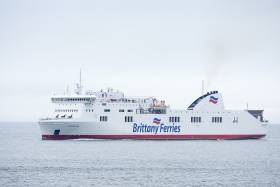Displaying items by tag: Charter Ropax
A one-year charter by Brittany Ferries of an additional ropax ship is being finalised ahead of the 2020 season.
The ropax will be operated by Brittany Ferries from November 2019 until November 2020. The goal is to deliver additional flexibility to a route network that connects Ireland, France, Spain and the UK.
The ship is to be chartered from Stena Ro-Ro and currently sails between Ancona and Trieste in Italy. The Visentini-class vessel will be the third of its kind on the Brittany Ferries fleet, joining Etretat and Connemara in November.
“This charter is an important step in our 2020 season planning,” said Christophe Mathieu, Brittany Ferries CEO. “We know that our flagship Pont-Aven will be out of service for at least ten weeks in the winter for the replacement of one of her four engines. This will leave a significant gap in capacity across our network.
“We also need to be sure that our fleet can cope with any potential delays in the delivery of our next cruise-ferry Honfleur, ahead of the busy 2020 summer season. For these two reasons, we have taken the prudent decision to charter a new vessel for one year.
“Furthermore, and given what we learnt from Government Brexit no-deal preparations in March and April, we believe it is sensible to generate additional capacity to prepare for the impacts of Brexit, should it happen at the end of October and should our services be needed.”
The new charter will take over Brittany Ferries sailings from Cork to Santander, extending the operating window for this service. The route, which represents the first time Spain and Ireland have been connected by ferry in their history, was opened in May 2018 for an initial two-year trial.
Connemara, which operates between Cork and Santander today, will be brought under the French-flag. This is six months earlier than originally planned and reinforces Brittany Ferries commitment to the employment of French seafarers.
Following her re-flagging, Connemara will be free to cover scheduled dry-dock periods for other vessels over the winter and to release Etretat (currently operating Portsmouth to Le Havre) to cover services from the UK to Spain in April.





























































